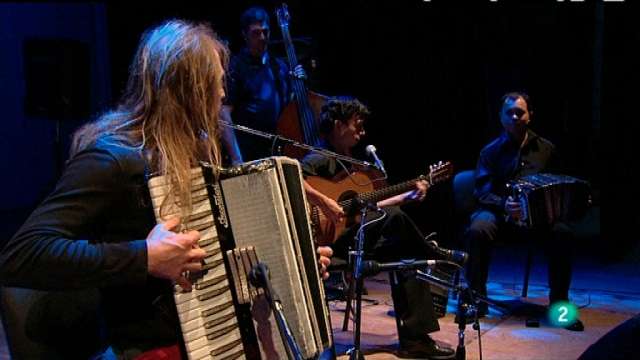A Musician Taking Cues From Worlds Near and Far
By Ben Ratliff
It rained miserably for most of David Byrne's Summerstage concert on Wednesday, and the sound of his current band doesn't withstand that kind of weather very well. Since last year, he has been touring with a band that includes the Tosca Strings, a six-member outfit from Austin, Tex., as well as a bassist, percussionist and drummer. He plays a little electric guitar, the arrangements are streamlined, and his voice is sounding strong. But it's both a well-wrought show and a delicate mutt: chamber music, mellow marimba tones and domesticated Afro-Cuban rhythm.
Mr. Byrne's legacy - beyond the sound he achieved with Talking Heads - is his songwriting. His catalog can be done all kinds of ways, signifying differently in passing eras. And on Wednesday he took his faith in his songs one step further, presenting a number of pieces from side projects and film soundtracks (including "The Heart's a Lonely Hunter," written in collaboration with the dance-music producers Thievery Corporation, and "What a Day That Was," written for "The Catherine Wheel," his collaboration with Twyla Tharp).
No doubt, the strings are suitable for a performer in his 50's; because Mr. Byrne is a nonstop conceptualist, they can also be seen as achieving a confluence of old and new world cultures on one bandstand, when they are put up against the funk and Latin rhythms coming from the rest of the band.
Yet they are not completely central to the sound. In certain old songs, they took on a specific role: they simulated the yammering harmonium solo in "I Zimbra" and the melodic synthesizer line in "This Must Be the Place." But the most effective songs in the set didn't have to do with them - "Road to Nowhere," arranged for marimba, acoustic guitar, bass and drums, and the end of "Psycho Killer," where Mr. Byrne played some nice, loud rhythm guitar.
Mr. Byrne is contradictory, of course. His career has been one big proposal for musical pluralism, but his music tends to come out in tightly defined boundaries. Someday, perhaps, he would be great as the director of a loose, semi-abstract group with a lot of improvisation. (In fact, others have played out that scenario for him: Phish once performed the entire Talking Heads album "Remain in Light.")
But for now he is defining himself more as the author of gently humorous songs that revolve around a single conceit, getting the job done without venturing into strange territories or making much of a ruckus.
He also continues to define himself as a citizen of the world. It must be said that Mr. Byrne sang in Italian, on "Un di Felice, Eterea," from Verdi's "Traviata," and Portuguese in "Ausencia," a song previously recorded by Cesaria Evora, not to make the point that he is born to sing in other languages, but more to illustrate the link between him and Pink Martini, the evening's opening act.
An 11-piece group from Portland, Ore., Pink Martini played elegant kitsch postcards from around the world, with references to Milan, Rio, Cuba and New York. It is a classically trained version of campy, superstyled bohemia, the same impetus that brought you the swing and rockabilly revivals; it is a kind of audible lifestyle choice.
